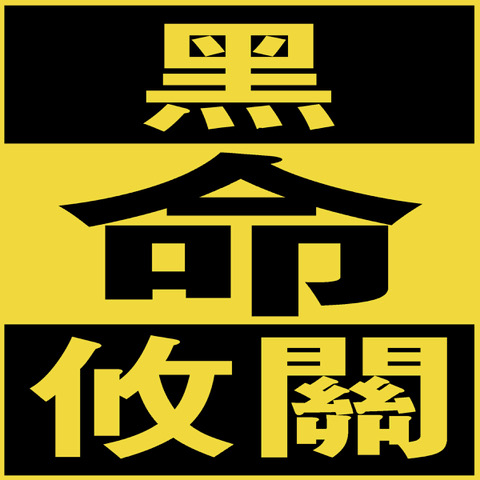The other day my friend Mel Chin asked me: how do you say ‘Black Lives Matter” in Chinese? It was late, I had had a drink, and just did what comes naturally to me: I consulted my inner sense of the Chinese language, and wrote him back:
重視黑人生命
see as important / black people’s / lives
which you could abbreviate, and still have it be recognizable, as 重黑命 (~BLM). I thought to myself that it wasn’t a translation that would automatically make sense to any Chinese speaker, since the primary meaning of hei/黑/black in political discourse is “dark, suspicious, corrupt”; but Chinese-speakers in the U.S. who saw that formula, on a T-shirt for example, would quickly understand what it was meant to say. 黑命 might, in some possible world, mean “ill-gotten lives,” but what would that be? 黑金, however, “black cash,” is instantly recognizable as a big political problem: payoffs, kickbacks, graft, the usual stuff. Giving a positive sense to “Black” in Chinese will take some work. There aren’t all that many people of African descent in the Chinese-speaking world, so getting people to notice the meaning of blackness in the U.S. sense is still a work in progress there. I liked that my Chinese version came out as an imperative: that seemed to me an integral part of the “matter” in the English, as when we say that something “matters” we are saying “this must matter, you must take it as something that matters.”
When I woke up the next day I realized that I had been over-hasty. In doing literary translation I can just consult my inner sense of the language and if necessary ask others what they think, but something like a political slogan depends very much on what people out there are saying and how they fill in the implicit blanks. So I went to some Chinese newspapers (I’m sorry to admit this, but if it’s about Chinese I am a lot more likely to be reading stories of shape-shifting monks from the Taiping yulan than the daily news), noticed that reporters were discussing 黑命貴 (hei ming gui, or “Black Lives Are Precious”), copied, pasted, and sent. I also liked the echo of the name of a certain guy who liked to bullfight, drink rum, and write about his adventures — a not totally inappropriate connotation for those brave enough to march against heavily-armed police, as was happening just then in my neighborhood.
So I’d replaced my inner Sprachgefühl with the vox pop., or so I thought, until I asked a few friends and learned that the way the slogan has been spun in certain Chinese media is repellent to my understanding of the movement. “Hei ming gui,” while unobjectionable on its face, has the effect of trivializing the claim. “Gui,” of course, also connotes expensive (like handbags and stuff). Worse yet, the slogan is spun as meaning that non-black lives are not precious, which is exactly the way the folks nostalgic for problem-free white supremacy take it: if one group’s lives are valued, so goes their attitude, then another group’s lives are devalued.
That was definitely not the point Mel was trying to make in circulating a Chinese version of the slogan. So back to consulting a range of better-informed friends. The translations they suggested (some their own, some repeated from others) had a range of tone and implication as well. 黑命攸關 (hei ming you guan) was one: “It’s a matter of black lives.” Or: “It comes down to black lives.” But this you guan is just a touch literary, less so than the homophonous 黑命有關 (“it’s about black lives”). Either way leaves the relation between “black” and “lifespan” (ming meaning the duration of a life as opposed to sheng, which connotes the life force) unclear, something the reader has to work out; and wherever there is such suspense, there’s a possibility of misunderstanding, which I didn’t want. The suggestion that one friend made, 黑人的命也是命 (heiren de ming ye shi ming, “black people’s lives are lives too”), guards against the accusation of “privileging” one group’s suffering, but has the disadvantage of being a bit long for T-shirts, bumper-stickers, or marching shouts.
In the end, Mel went with the alternative that combined recognizability with brevity, as best suits the medium.
What this shows about translation is stuff I always-already knew, but didn’t have in mind: that when you frame your thoughts in any language you are addressing somebody who has their own ideas about what you are likely to say, and you may need to guard against a pre-existing meaning or challenge a stereotype in order to get said what you need said. A relational model of meaning, as we say in the trade, means that you’re always answering a question you didn’t expect.

